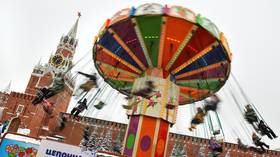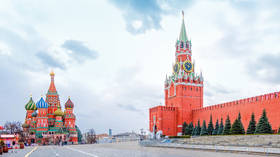White House admits Russia has survived Western sanctions

The Russian economy has managed to hold up against the massive sanctions imposed by Western countries and their allies over Moscow’s military operation in Ukraine, White House National Security Council spokesman John Kirby admitted on Friday.
As the conflict enters its second year, Washington revealed more anti-Russia penalties, targeting dozens of companies and individuals linked to the country, and raising tariffs on Russian goods whose imports were still allowed. Meanwhile, the EU approved its tenth package of sanctions against Russia, which includes export limitations on dual-use items and technology, measures against so-called Russian disinformation, and new restrictions against individuals and entities for their alleged support of the Russian military. Western allies Britain, Switzerland, Australia, Japan and New Zealand joined the measures.
Russia’s economy is “showing some resilience,” according to Kirby, who added, however, that it’s not clear whether this “can be sustained for the long haul.”
“He has had to take some drastic measures to prop up his economy, to prop up his currency, including playing pretty aggressively with interest rates, for instance,” Kirby said, commenting on steps approved by Russian President Vladimir Putin.
Russian statistics service Rosstat reported that GDP of the sanctions-hit nation contracted by just 2.1% in 2022, much less than the 10-15% some had predicted after sanctions hit last March. The Russian economy is actually forecast to increase by 0.3% during the current year, according to the International Monetary Fund (IMF).
The strength of the Russian economy has been partially attributed to global prices for oil and gas, which saw a dramatic surge shortly after one of the world’s biggest exporters of the two commodities was targeted by Western sanctions. The growth of energy prices has reportedly compensated for the drop in the volume of the country’s exports.
At the same time, Russia managed to re-orient some of its exports, including energy sales, eastwards after Western buyers opted to shun direct shipments under the sanctions pressure.
The Russian national currency, the ruble, has also managed to stay afloat after bouncing back following a dramatic decline seen shortly after the sanctions were imposed last March. This has been attributed to strict capital controls, a dramatic interest-rate hike by the Russian central bank, and the country’s move to trade transactions with allied countries in domestic currencies.
The share of the ruble in Russia's international settlements has doubled compared with December 2021. Last week, President Putin said that Moscow would continue to work with partners to form a stable and secure global payment system independent of the US dollar and of other Western currencies.
The ruble strengthened further after Moscow introduced a new payment mechanism from April 1. This requires nations that impose sanctions on Russia to pay for natural gas in rubles.
President Putin has also attributed Russia’s economic resilience to the country’s strong agricultural sector. According to the latest data provided by Russia’s statistics service, the harvest amounted to 153.8 million tons, a 26.7% increase year-on-year against 2021.
“By the end of the agricultural year, that is, by June 30, 2023, we will be able to bring the total volume of grain exports to 55-60 million tonnes,” he said last week during his annual address to the Federal Assembly.
Meanwhile, parallel imports of non-sanctioned products and flourishing trade with countries that refrained from punishing Moscow had also contributed to the economic resilience. In addition, Russia has been successful in moving a lot of products to Asian markets such as India and China, and to Türkiye.
Additionally, Russia also had several years to prepare for sanctions following its reunification with Crimea in 2014. Moscow succeeded in developing an alternative to SWIFT, the messaging network that underpins global financial transactions. This came in response to Western threats to cut the country off from the international banking system.
The Russian authorities also created a national payment system called Mir as a domestic alternative to Visa and Mastercard, after Crimea-related sanctions were imposed. The Central Bank of Russia has issued some 150 million Mir cards since late 2015.
For more stories on economy & finance visit RT's business section














